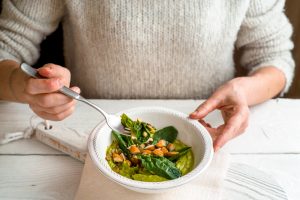Iron is an important nutrient for growth and development. It plays an essential role in transporting oxygen in the blood, DNA synthesis, breathing, immune function and energy production.
The World Health Organisation has recently labelled iron deficiency as a global public health problem of “epidemic proportions”.
How much iron do we need?
According to Nutrition Australia the recommended daily intake of iron differs depending on our age and sex. They propose the following guidelines:
- 1 – 3 years: 9mg
- 4 – 8 years: 10mg
- 9 – 13 years: 8mg
- 14 – 18 years (girls): 15mg
- 14 – 18 years (boys): 11mg
- 19 – 50 (women): 18mg
- Males 19+: 8mg
- Females 51+: 8mg
What is iron deficiency anemia?
Anaemia occurs when there is not enough haemoglobin in the red blood cells. The most common type of anaemia is iron deficiency anaemia. It occurs when the body doesn’t have enough iron to make haemoglobin, resulting in a lack of oxygen circulating the body.
Iron deficiency is a common condition but many people don’t know they have it, often experiencing symptoms without knowing.
Symptoms of iron deficiency
- Fatigue
- Weakness
- Pale skin
- Dizziness
- Shortness of breath
- Tingling in the legs
- Cold ands and feet
- Brittle nails
- Headaches
Risk factors
While it is a common condition that can occur in men and women of any age or ethnicity, some are at greater risk than others.
- Women of childbearing age
- Pregnant women
- People with poor diets
- Those who donate blood regularly
- Infants and children
- Vegetarians who don’t replace meat with iron-rich foods.
Iron rich foods
Iron is a mineral which can be found in many foods. Increasing the iron intake in your diet can help prevent and sometimes treat iron deficiency. While red meat is the first food that comes to mind when we think about iron there are other options.
- Red meat (beef, kangaroo, lamb)
- Kidney beans
- Green lentils
- Tofu
- Chickpeas
- Spinach
- Rolled aots
- Cashews and almonds
- Broccoli
- Wholemeal pasta and bread
- Brown rice
- Dried apricots
If you’re concerned about your iron levels talk to your doctor about your diet and supplements.





